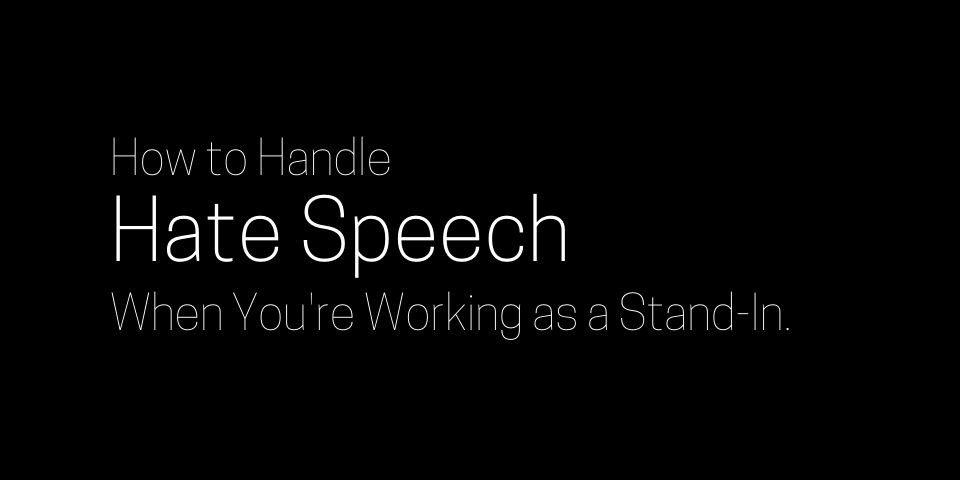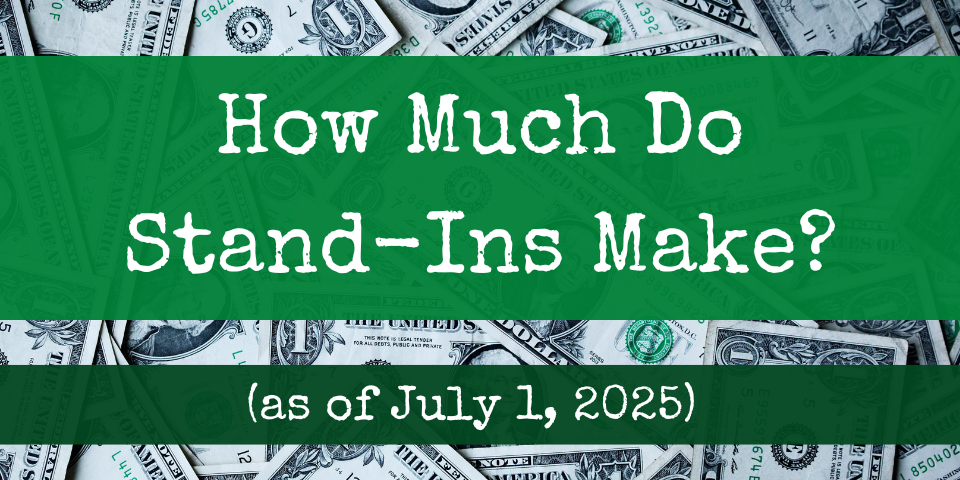“I hate you.”
This is what a SAG-AFTRA member said to me on a job earlier this year, when I was working as a stand-in.
The response came after a friendly discussion. In the conversation, I explained I was fi-core. “Fi-core” is short for “financial core.”
“Financial core” means merely paying an initiation fee and periodic dues to a union in order to work union jobs, without an additional obligation of following union membership rules in order to work. In practice, someone who is fi-core is lawfully permitted to work both union and non-union jobs. I cover the topic in The Fi-Core Workbook.
The SAG-AFTRA member, who was also working on the job, immediately said “I hate you” upon my sharing I was fi-core.
On its face, this was hate speech on the job. How did I handle it?
How I Handled It
When I first heard the SAG-AFTRA member reply to me, “I hate you,” I recall surprise between us both at the bluntness of the SAG-AFTRA member’s reply.
What ensued was a discussion about fi-core. I asked the SAG-AFTRA member to explain why that sentiment, and I listened to the SAG-AFTRA member’s understanding of fi-core status. I responded to the SAG-AFTRA member’s position with some information about the legal history of financial core status in the United States Supreme Court. We were on set when this was happening.
The discussion continued until it couldn’t because of work obligations. I expressed to the SAG-AFTRA member I would like to continue the conversation to understand more of the SAG-AFTRA member’s perspective.
Through no fault of either of us, we did not get to have that conversation later.
Was This Hate Speech?
Yes. This was hate speech. This was a fellow employee telling me “I hate you.” This was an expression of hatred of me because of an identity factor.
With that said, was the expression of hatred hostile? From my perspective, the expression was not exactly hostile, but it was not a joke.
I may have had some power in the conversation, given the SAG-AFTRA member was essentially a jobber and I had a longer history of working on the job. So, given the power dynamic, the SAG-AFTRA member may have tempered any hostility– especially also considering this was speech on the job rather than off the job. I do not know.
The SAG-AFTRA member’s expression “I hate you” may have been said with some level of exaggeration–a sort of “joking hatred.” However, it appeared to me the SAG-AFTRA member did have some level of hatred of me because of my fi-core status, and engaged in discussion of why he hated me, so an exaggeration of hatred would not invalidate the apparent hatred the SAG-AFTRA member had of me for being fi-core.
What I Could Have Done
The thing is: I’m not clear on what I could have done.
This lack of clarity is part of what’s difficult about working as a stand-in in a union environment, and furthermore as fi-core.
The lack of clarity on what to do promotes figuring out ad hoc solutions, rather than following clear guidance from the employer or the union on what to do when faced with hate speech on the job from a SAG-AFTRA member.
Other Employees or the Employer
I suppose I could have turned to someone else working on the job, such as a director or a producer.
However, handling hate speech expressed by a SAG-AFTRA member on a job may not be something they are qualified to handle. Plus, they’re busy.
The Employer’s HR Department
I suppose I could have turned to the human resources department for the employer to report the hate speech.
However, I did not know how to do that. That information was not provided to me, and I was not certain whether the HR department applied in interactions between unionized employees, who essentially were day players.
Contact information for HR departments is rarely if ever provided to stand-ins. And generally: HR representatives are not on set, especially in light of the current coronavirus pandemic.
SAG-AFTRA
I suppose I could have contacted SAG-AFTRA about the hate speech on the job.
However, as fi-core, I am not a SAG-AFTRA member, so I am uncertain whether a SAG-AFTRA nonmember can press for discipline against a SAG-AFTRA member expressing hate speech on a union job.
Furthermore, SAG-AFTRA appears to facilitate animosity toward fi-core status on its website, and it has done so for more than a decade. For example, it states, “Financial Core/Fi-Core/FPNM are viewed as scabs or anti-union by SAG-AFTRA members, directors, and writers-most of whom also belong to entertainment unions.”
Such expression by the union is unnecessary to publish, and it effectively works as kindling for SAG-AFTRA members to express hate speech against fi-core employees.
Such expression on SAG-AFTRA’s website also serves to make fi-core employees disbelieve SAG-AFTRA will help them when faced with hate speech on a union job expressed by a SAG-AFTRA member.
SAG-AFTRA Field Rep
I supposed I could have spoken to a SAG-AFTRA field rep about that hate speech on the job.
However, no SAG-AFTRA field rep came to set when this happened or on the days we worked.
Do SAG-AFTRA Membership Rules Protect Member Hate Speech?
When a SAG-AFTRA member violates one of its Membership Rules, the SAG-AFTRA member can face discipline.
Does hate speech by a SAG-AFTRA member violate its Membership Rules?
SAG-AFTRA’s current Membership Rules state as Rule 7:
No member shall engage in abusive conduct toward any other person […]
Rule 7 continues by pointing out “abusive conduct” is not limited to sexual harassment, sexually abusive conduct, and the use of threats of violence.
In other words, Rule 7 includes abusive expressions (like threats and harassment), not merely abusive actions (like violence or sexual abuse).
Rule 7 appears to apply to conduct by a SAG-AFTRA member on and off a job site. For example, one should note that Rule 7 covers member-on-person conduct, not merely member-on-member conduct, without expressed boundary on where the affected person is or isn’t. Rule 7 appears to make clear a SAG-AFTRA member may violate Rule 7 if that member engages in abusive conduct toward “any other person,” not simply another member.
But, again, it’s not clear if I could press this point with SAG-AFTRA, as I am fi-core, and the union appears to facilitate the expression of hatred against fi-core with its long-published expressions about fi-core on its website.
Gratitude Is Not Safety
Looking back, I’m grateful the hate speech did not lead to apparent hostility, visible conflict, or on-the-job violence (the kind witnessed in the broadcast slap of a SAG-AFTRA member by another SAG-AFTRA member at the 2022 OSCARS® ceremony). If the hate speech had turned violent, I suspect I would have sought the immediate help or intervention of a representative of the employer, if I could identify one in the moment.
With that said, arriving at gratitude is not a signal that I am safe. That there is hate speech against fi-core that can appear on the job warrants examination of the topic, as well as the provision of guidance on what to do when faced with it or how one may be protected from it or its consequences.
Hopefully, you found this webpage on Stand-In Central to guide you in the event you are faced with hate speech when you are standing in, so that you have some ideas on what to do.
Have you been the target of hate speech by a SAG-AFTRA member on a stand-in job? Share your anecdotes in the comments below.







Leave A Comment